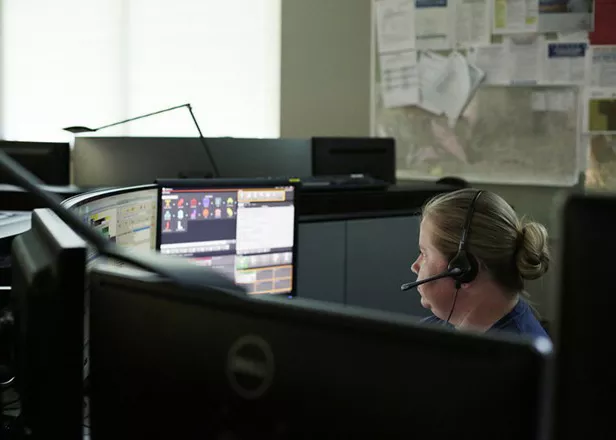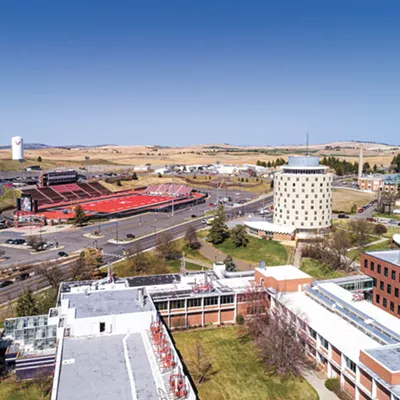
Similar to many on-again, off-again relationships, the board of the Spokane Regional Emergency Communications center has apparently hit a breaking point and wants the city of Spokane to commit: Are you in this relationship, or out of it?
Specifically, the center's governing board wants to know if Spokane wants to answer all of its own 911 calls as a "primary Public Safety Answering Point" or to become a "member agency" of the regional dispatch center, which was created in 2018 to handle all fire and law enforcement calls in the county.
On April 18, the board voted to send a letter to Spokane Mayor Lisa Brown asking for a "final decision no later than the close of business on May 24." If the city decides to go its own way, the letter says that the board wants the city to take over its own 911 calls by January 2025.
Between fire, medical, law enforcement and Crime Check (nonemergency crime) calls, incidents in the city account for a little more than half of all 911 calls in the county.
But right now, the city has also only halfway committed.
The center, which city and county staff refer to as SREC (pronounced "shrek"), has taken calls and handled dispatch for the Spokane Fire Department since 2022. That same year, the Spokane Police Department opted to maintain its own city-employed call takers/dispatchers, who work out of the same building as SREC staff.
Currently, SREC is helping fire and police agencies update to the same computer-aided dispatch system, and planning to build a new facility for its operations.
Finalizing those plans requires an answer one way or the other from the city, says Cody Rohrbach, the SREC board chair and fire chief for Spokane County Fire District 3.
"We have some big decisions in front of us as a board," Rohrbach says. "Whether the city is in or out affects how we approach those decisions for the future."
SREC was created as a public development authority and was intended to bring all the county's 911 call takers and dispatchers under one roof.
In 2018 Spokane County voters approved a 0.1% sales and use tax (10 cents per $100 purchase) to help fund the new integrated 911 center and upgrade countywide communications systems. In 2023, that tax brought in $15.7 million, according to the most recent SREC annual report.
It's estimated that the computer-aided dispatch upgrades will cost $5 million, but it's still unclear whether Spokane will fully join in that project or contribute to the cost.
Meanwhile, SREC also receives funding from a 911 excise tax — Spokane County residents pay $0.95 per month on their phone bills (mobile or landline) to help upgrade and maintain the 911 phone system, as well as pay for staff. That tax brought in about $5.3 million last year.
The third source of funding comes from user fees that SREC charges to all agencies based on their call volume. That brought in about $7.3 million last year.
In June 2019, about a year after SREC was started, the Spokane City Council voted to get out of the joint 911 center and instead use city-employed dispatchers to answer the city's fire and police calls.
In 2021, state lawmakers required large counties that levy the 911 sales and use tax to create an interlocal agreement to share that revenue. If they didn't come to an agreement within a year, the city or county could seek "equitable apportionment" of that revenue, retroactive to the effective date of the 2021 law.
Spokane and Spokane County have not reached an agreement on how to share the money.
Another bill that failed to pass this year would've similarly tasked cities and counties with divvying up the 911 excise tax revenue.
"As we look at moves to apportion the [taxes], it creates uncertainty around SREC's future for planning," Rohrbach says. "Certainly we're willing to support apportioning those tax dollars if the city wants to go their own way."
Meanwhile, SREC has been building up reserves in anticipation of constructing a new facility. Kelly Conley, SREC's communications manager, says that the operational and building reserve fund has about $24.7 million in it. The center's ending cash and investments reported to the city for 2023 was about $33.7 million.
Spokane City Council member Michael Cathcart, the previous chair of the council's Public Safety Committee, says that he hasn't seen the letter, but this conversation has been ongoing for about two years. He notes with frustration that it took months to get SREC staff to come speak with the council about call times and how effective the joint service is.
"I continue to hear frustrations with 911. ... At this point in time, I'm not overly impressed with the service," Cathcart says. "I'd say we should go our own way."
In an emailed statement, Mayor Brown expressed concerns about the tax revenue currently all going to SREC, which also charges user fees and is keeping millions in reserves.
"My responsibility is to the people across the City of Spokane. Accordingly, I need to ensure the governance is structured properly, the service levels are appropriate, and that dollars are being spent wisely," Brown says. "My team is evaluating every avenue as we craft our response." ♦
Editor's note: This story was updated on May 2 to correct a typo in the percentage of the sales and use tax. It is one tenth of one percent.
























